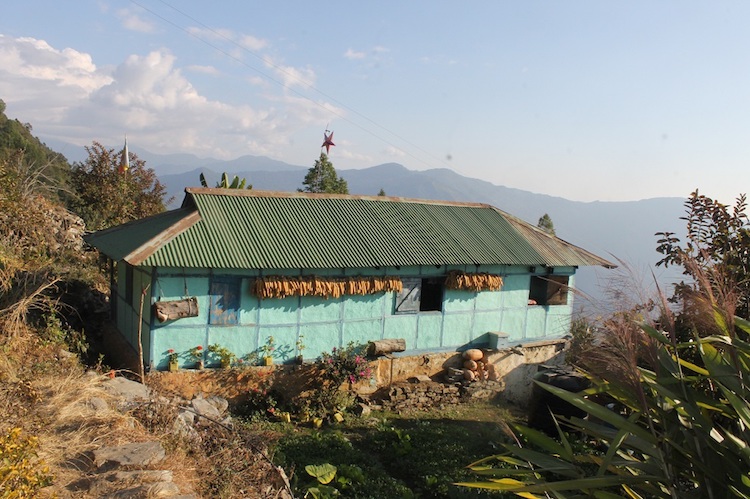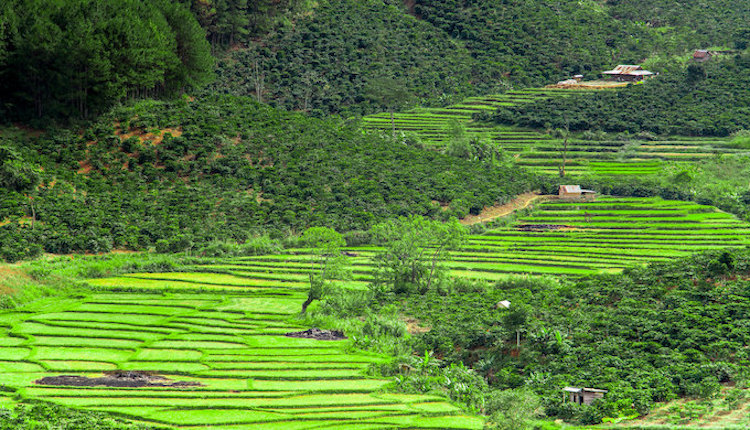Dealing With Land Degradation Through Organic Farming

By Soumya Sarkar
The move towards organic farming in Bhutan, Nepal, and the Indian state of Sikkim provides a clear way forward in dealing with land degradation and pursuing sustainable development in the Himalayas
A sustained policy push for organic agriculture is key to fighting land degradation in the Hindu Kush Himalaya (HKH) region, said a report released at the United Nations desertification summit that concluded last week in New Delhi. Successful policy implementation in the Himalayan kingdom of Bhutan and the Indian state of Sikkim has shown how agroecology and organic agriculture in the Himalayas enhance fertile landscapes, protect biodiversity and improve living conditions of the people, the report said. “The transition to sustainable food and agriculture systems is critical for a sustainable future. Both Sikkim and Bhutan show with their 100% organic goals that such a transition is possible,” said Ibrahim Thiaw, Executive Secretary, UN Convention to Combat Desertification (UNCCD). “We can learn many lessons from their exemplary actions on policy-making.” Terraced rice fields in the western Himalayas [image by: Hugh Derr]
The HKH region extends 3,500 km over eight countries, from Afghanistan in the west to Myanmar in the east. It provides water, ecosystem services, and the basis for livelihoods to a population of around 240 million people. Its river basins provide water to as many as 1.9 billion people, a fourth of the world’s population.
Humanity needs to manage land more efficiently to avoid a climate breakdown, a United Nations scientific report warned in August. Growing human pressure is degrading land globally and climate change is adding to these pressures, it said. Some countries, especially in Asia, have pointed out that they are suffering from serious land degradation, which includes west and north-west China and the Bundelkhand, northern Gujarat, Marathwada, Vidarbha and Telangana in India.
Sustainable farming
Fortunately large areas of Bhutan, Nepal and the Indian Himalayas have mostly remained untouched by the disruptive effects of the Green Revolution due to inaccessibility and difficult mountainous terrain. In the past 10 years, policymakers in Bhutan, Nepal and Indian have recognised the need to transition toward sustainable agricultural systems to preserve natural resources and improve livelihoods for rural populations.
“Political commitment has been concretely implemented with varying degrees of intensity, including policies and programmes with specific budget earmarks for measures supporting organic farming and agroecology,” said the report titled The Mainstreaming of Organic Agriculture And Agroecology in the Himalaya Region. The report was prepared by the World Future Council (WFC) and IFOAM Organics International with support from the Schweisfurth Foundation. It was released at the just concluded biennial summit of the UNCCD.
The report showcases existing political support towards organic farming and agroecology across the Himalayan region and provides insights on the current institutional efforts and limitations of mainstreaming sustainable agriculture with a focus on three countries — Bhutan, India and Nepal. “By scaling up organic agriculture and agroecology, it is possible to tackle malnutrition, social injustice, climate change, and loss of biodiversity,” said Alexandra Wandel, Executive Director of WFC.
Courtesy: thethirdpole.net
For full story click here
Terraced rice fields in the western Himalayas [image by: Hugh Derr]
The HKH region extends 3,500 km over eight countries, from Afghanistan in the west to Myanmar in the east. It provides water, ecosystem services, and the basis for livelihoods to a population of around 240 million people. Its river basins provide water to as many as 1.9 billion people, a fourth of the world’s population.
Humanity needs to manage land more efficiently to avoid a climate breakdown, a United Nations scientific report warned in August. Growing human pressure is degrading land globally and climate change is adding to these pressures, it said. Some countries, especially in Asia, have pointed out that they are suffering from serious land degradation, which includes west and north-west China and the Bundelkhand, northern Gujarat, Marathwada, Vidarbha and Telangana in India.
Sustainable farming
Fortunately large areas of Bhutan, Nepal and the Indian Himalayas have mostly remained untouched by the disruptive effects of the Green Revolution due to inaccessibility and difficult mountainous terrain. In the past 10 years, policymakers in Bhutan, Nepal and Indian have recognised the need to transition toward sustainable agricultural systems to preserve natural resources and improve livelihoods for rural populations.
“Political commitment has been concretely implemented with varying degrees of intensity, including policies and programmes with specific budget earmarks for measures supporting organic farming and agroecology,” said the report titled The Mainstreaming of Organic Agriculture And Agroecology in the Himalaya Region. The report was prepared by the World Future Council (WFC) and IFOAM Organics International with support from the Schweisfurth Foundation. It was released at the just concluded biennial summit of the UNCCD.
The report showcases existing political support towards organic farming and agroecology across the Himalayan region and provides insights on the current institutional efforts and limitations of mainstreaming sustainable agriculture with a focus on three countries — Bhutan, India and Nepal. “By scaling up organic agriculture and agroecology, it is possible to tackle malnutrition, social injustice, climate change, and loss of biodiversity,” said Alexandra Wandel, Executive Director of WFC.
Courtesy: thethirdpole.net
For full story click here
A sustained policy push for organic agriculture is key to fighting land degradation in the Hindu Kush Himalaya (HKH) region, said a report released at the United Nations desertification summit that concluded last week in New Delhi. Successful policy implementation in the Himalayan kingdom of Bhutan and the Indian state of Sikkim has shown how agroecology and organic agriculture in the Himalayas enhance fertile landscapes, protect biodiversity and improve living conditions of the people, the report said. “The transition to sustainable food and agriculture systems is critical for a sustainable future. Both Sikkim and Bhutan show with their 100% organic goals that such a transition is possible,” said Ibrahim Thiaw, Executive Secretary, UN Convention to Combat Desertification (UNCCD). “We can learn many lessons from their exemplary actions on policy-making.”
 Terraced rice fields in the western Himalayas [image by: Hugh Derr]
The HKH region extends 3,500 km over eight countries, from Afghanistan in the west to Myanmar in the east. It provides water, ecosystem services, and the basis for livelihoods to a population of around 240 million people. Its river basins provide water to as many as 1.9 billion people, a fourth of the world’s population.
Humanity needs to manage land more efficiently to avoid a climate breakdown, a United Nations scientific report warned in August. Growing human pressure is degrading land globally and climate change is adding to these pressures, it said. Some countries, especially in Asia, have pointed out that they are suffering from serious land degradation, which includes west and north-west China and the Bundelkhand, northern Gujarat, Marathwada, Vidarbha and Telangana in India.
Sustainable farming
Fortunately large areas of Bhutan, Nepal and the Indian Himalayas have mostly remained untouched by the disruptive effects of the Green Revolution due to inaccessibility and difficult mountainous terrain. In the past 10 years, policymakers in Bhutan, Nepal and Indian have recognised the need to transition toward sustainable agricultural systems to preserve natural resources and improve livelihoods for rural populations.
“Political commitment has been concretely implemented with varying degrees of intensity, including policies and programmes with specific budget earmarks for measures supporting organic farming and agroecology,” said the report titled The Mainstreaming of Organic Agriculture And Agroecology in the Himalaya Region. The report was prepared by the World Future Council (WFC) and IFOAM Organics International with support from the Schweisfurth Foundation. It was released at the just concluded biennial summit of the UNCCD.
The report showcases existing political support towards organic farming and agroecology across the Himalayan region and provides insights on the current institutional efforts and limitations of mainstreaming sustainable agriculture with a focus on three countries — Bhutan, India and Nepal. “By scaling up organic agriculture and agroecology, it is possible to tackle malnutrition, social injustice, climate change, and loss of biodiversity,” said Alexandra Wandel, Executive Director of WFC.
Courtesy: thethirdpole.net
For full story click here
Terraced rice fields in the western Himalayas [image by: Hugh Derr]
The HKH region extends 3,500 km over eight countries, from Afghanistan in the west to Myanmar in the east. It provides water, ecosystem services, and the basis for livelihoods to a population of around 240 million people. Its river basins provide water to as many as 1.9 billion people, a fourth of the world’s population.
Humanity needs to manage land more efficiently to avoid a climate breakdown, a United Nations scientific report warned in August. Growing human pressure is degrading land globally and climate change is adding to these pressures, it said. Some countries, especially in Asia, have pointed out that they are suffering from serious land degradation, which includes west and north-west China and the Bundelkhand, northern Gujarat, Marathwada, Vidarbha and Telangana in India.
Sustainable farming
Fortunately large areas of Bhutan, Nepal and the Indian Himalayas have mostly remained untouched by the disruptive effects of the Green Revolution due to inaccessibility and difficult mountainous terrain. In the past 10 years, policymakers in Bhutan, Nepal and Indian have recognised the need to transition toward sustainable agricultural systems to preserve natural resources and improve livelihoods for rural populations.
“Political commitment has been concretely implemented with varying degrees of intensity, including policies and programmes with specific budget earmarks for measures supporting organic farming and agroecology,” said the report titled The Mainstreaming of Organic Agriculture And Agroecology in the Himalaya Region. The report was prepared by the World Future Council (WFC) and IFOAM Organics International with support from the Schweisfurth Foundation. It was released at the just concluded biennial summit of the UNCCD.
The report showcases existing political support towards organic farming and agroecology across the Himalayan region and provides insights on the current institutional efforts and limitations of mainstreaming sustainable agriculture with a focus on three countries — Bhutan, India and Nepal. “By scaling up organic agriculture and agroecology, it is possible to tackle malnutrition, social injustice, climate change, and loss of biodiversity,” said Alexandra Wandel, Executive Director of WFC.
Courtesy: thethirdpole.net
For full story click here
Latest Videos
















